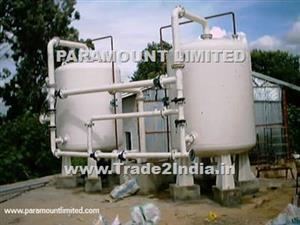
Cartridge Filters
Paramount offers high solid holding capacities and are used in particulate filtration and pre-filtration water to Reverse Osmosis, deionization & EDI system.
Cartridge filters have larger surface areas compared to other conventional filters like sand filter etc. This enables cartridge filters to operate for longer periods, as obstructions occur less with bigger filter surfaces. Cartridge filter systems also permit better water flow with minimum installation area. The filters are mainly made up of polyester , ceramic and carbon or some other material that can provide a superfine filtering surface.
SAND FILTER
Sand filters are used for water purification. There are two main types:
1. Gravity Sand Filters
2. Pressure Sand Filters
Both the methods are used extensively in the water treatment plants throughout the world. The both the type require the use of flocculant to work effectively.
They can be operated either with upward flowing fluids or downward flowing fluids the latter being much more usual. For downward flowing devices the fluid can flow under pressure or by gravity alone. Pressure sand bed filters tend to be used in industrial applications. Gravity sand filters are used in water purification especially drinking water.
PRESSURE SAND FILTER
The Gravity sand filters are known as Rapid sand filters. Smaller sand grains provide more surface area and therefore a higher decontamination of the inlet water, but it also requires more pumping energy to drive the fluid through the bed. The depth of the sand bed is recommended to be around 0.6-1.8 m. Normally these filters are designed at a maximum flow rate of 10-20 m3/m2/hr. Using the required throughput and the maximum flow rate, the required area of the bed can be calculated.
The main important point for design is to keep in mind is the distribution of fluid across the bed. Pressure sand filters are typically operated with a feed pressure of 2 to 5 bar. The build-up of particulate solids causes an increase in the pressure drop across the bed for a given flow rate. For a gravity bed when the pressure drop or flow is unacceptable the bed is back washed to remove the accumulated particles. For back wash water is pumped backward through the bed until it is fluidized and has expanded by up to about 28 to 30%. The range of back wash water flow is typically 3 to 10 m3/m2/hr and duration is 5-15minutes.
Paramount offers Pressure sand filters for both municipal and industrial water treatment for the removal of suspended solids. Pressure filters are installed after settling/clarification equipment. These filters are used in the pretreatment of ACF/DM/UF/RO systems to increase the life and efficiency of down the line installed systems.
Paramount design horizontal and vertical pressure vessels to meet various constraints of a customer such as water quality, footprint, back wash requirements and flow requirements. Vessels are designed for various pressure capacities.
Media options and arrangements are several and depend on the application and internal piping arrangement but often consist of a dual-media sand-and-anthracite arrangement (to minimize backwash frequency) above a gravel support bed.
Activated Carbon Filters :
Paramount offers activated carbon filters for removal of organic impurities, odor, colour and free chlorine from water. ACF are also used in effluent treatment plants as polishing filters before disposal of the treated water to take care of left over COD.
These filters are used as pretreatment equipment to increase the life and efficiency of DM, UF and reverse osmosis plants.
These filters are mainly designed based on the contact time required for contaminant removal and media replacement frequency. These filters can be backwash based on the pressure drop across the bed.








